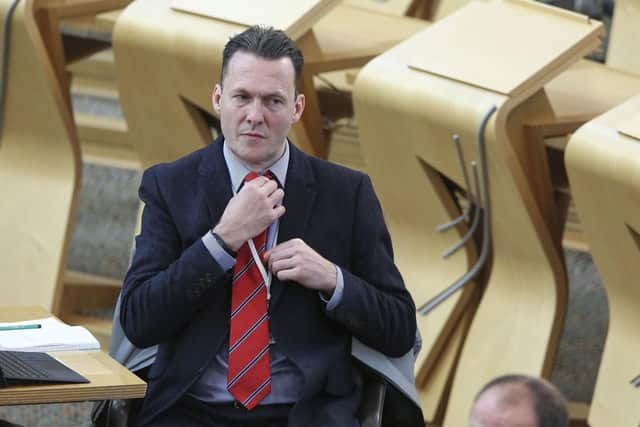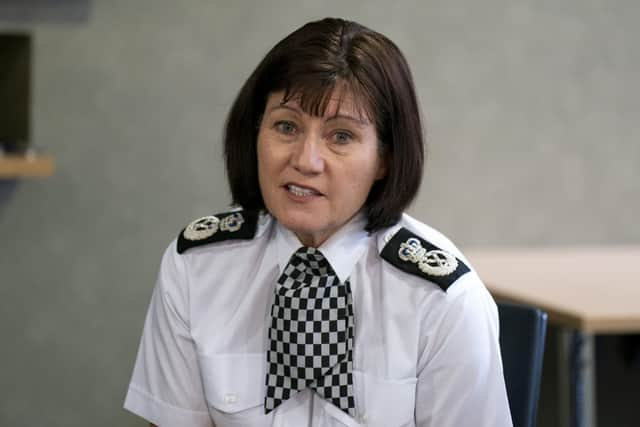Hate crime laws: MSPs pile pressure on Police Scotland to stop recording non-criminal hate incidents
Police Scotland will continue to record hate incidents that are not criminal despite MSPs warning the country’s Chief Constable the contentious policy could be open to a legal challenge.
Scotland’s police force has been urged to redraw its policy to record all “hate incidents” ahead of the new hate crime legislation, which has been labelled “sinister” by critics, coming into force next month. A legal challenge south of the Border has meant officers in England and Wales no longer record incidents that are malicious or trivial.
Advertisement
Hide AdAdvertisement
Hide AdA cross-party Holyrood committee has asked Scotland’s top police officer, Jo Farrell, whether the force will “update its policy” ahead of the hate crime legislation rolling out.


Police Scotland said the “perception of the victim” in any hate incident was “the defining factor” in determining whether it was recorded.
The law, which comes into affect on April 1, will create new stirring up of hatred offences for protected characteristics including age, disability, religion, sexual orientation and transgender identity. These extra provisions will add to the long-standing stirring up racial hatred offences, which have been in place since 1986.
Under the law, offences are considered "aggravated" if they are motivated by prejudice on the basis of set characteristics, which could influence sentencing by judges. Crucially, a criminal act must have occurred for the hate crimes aggravator to be applied.
Statistics show 5,738 charges of hate crime were reported in Scotland in 2022/23, although hate crimes are thought to be under-reported.


The Scottish Government faced criticism during debate around the hate crime legislation after misogyny was absent from the list of characteristics.
Following a review by barrister Baroness Helena Kennedy KC, SNP ministers have tabled plans to make misogyny a separate offence. An offence of stirring up hatred against women and girls and a statutory aggravator, on a par to the hate crime law, could allow courts to take misogyny into account for sentencing.
Humza Yousaf, who was responsible for the legislation in his previous position as justice secretary, amended the Bill after concerns were raised about free speech and the threshold for prosecution – with the “stirring up” only to be considered if it was intentional.
Advertisement
Hide AdAdvertisement
Hide AdSpeaking at the time, Mr Yousaf pointed to “those who think they may accidentally somehow fall foul of the law” for having strong views. He insisted that “solely stating any belief, which I accept may be offensive to some, is not breaching the criminal threshold”.
But three years on, concerns remain the legislation could stifle free speech, with David Kennedy, the general secretary of the Scottish Police Federation warning that “interpretation” of the law could cause problems.
Rolling out the controversial laws has been delayed to enable police to undertake training and upgrade IT systems. But despite the extra time to prepare, Mr Kennedy warned officers have not had enough training to enforce the new law, with only “digital face-to-face training workshops” provided, which the police federation union has blamed on cutbacks.
Holyrood’s cross-party Criminal Justice Committee has now written a letter to Ms Farrell, chief constable of Police Scotland, demanding to know whether measures to “ensure that officers and staff are aware of the provisions in the legislation” have taken place and “confirm they have received sufficient training”.
Ms Farrell has also been pressed over whether Police Scotland intends to update its policy that “a crime can be recorded based on the perception of the person reporting an incident to them”, even if no crime has been committed.
Under Police Scotland policy, officers are required to record all hate incident reports, even if there is no evidence of a crime. Hate crimes are recorded under the Scottish crime recording standards while non-crime hate incidents are recorded on the vulnerable persons database.
Police forces in England and Wales do not record anything that is “trivial, malicious or irrational”, but Police Scotland has not indicated there will be any change north of the Border ahead of the new legislation coming into effect.
Scottish Conservative shadow justice secretary Russell Findlay said: “Humza Yousaf's hate crime law has sat on the shelf for three years partly because of serious concerns relating to its interpretation and enforcement by Police Scotland.
Advertisement
Hide AdAdvertisement
Hide Ad"It is clear from the national force's recent public relations attempts that these problems remain. The police seem to be as confused as the public and it would be sinister and wrong for any record to be kept of non-crimes.
"The only sensible thing would be for the SNP Government to repeal this dangerous, confusing and unworkable legislation, which risks harming free speech, and heed our calls to give police officers the resources they need to keep people safe."
Hate crimes can also be reported through third-party reporting centres, which speak to victims who may feel uneasy about going to the police and upload their complaints online.
A storm emerged last week after the Luke & Jack LGBTQ+ sex shop in Glasgow, which has been a reporting centre for a decade without hostility, received a torrent of abuse on social media after its inclusion on a list of reporting centres gained traction.
Ian Diamond, co-founder of Luke & Jack, said victims had told him “quite harrowing things that have happened to them”.
He said: “We will listen and help people get information to the police in a manner that’s safe and secure for them. We give people that safe space to provide that information if something has happened to them.
“You don’t actually have to be the victim yourself to do the reporting. It can also be anonymous.”
Mr Diamond said the third party reporting provided “someone to talk to and know that they are being taken seriously”. Third party reporting centres take the details of the person and go through what they would like to report.
Advertisement
Hide AdAdvertisement
Hide AdMr Diamond added: “We then go through any follow-up questions that they might want to talk about. We receive training to be able to ask the right questions and get that information into the website”.
A Police Scotland spokesperson said the training means “officers are best prepared when they respond to hate crimes and incidents”.
The spokesperson said: “For recording purposes, the perception of the victim or any other person is the defining factor in determining whether an incident is a hate incident or in recognising any malice element of a crime. The alleged actions of the perpetrator must amount to a crime under the rules of the Scottish Crime Recording Standards.
“Police Scotland developed national guidance to support officers in recognising, investigating and progressing reports of hate crimes and hate incidents. The guidance was produced on April 27, 2021 and makes clear the victim-centred approach officers must take in recording and understanding the impact the incident has had upon the victim.”
SNP victims and communities minister Siobhian Brown said: “The new hate crime laws are designed to tackle the harm caused by hatred and prejudice and provide greater protection for victims and communities. The laws have a high threshold for proving offences of stirring up hatred and the supporting materials explain how the thresholds of the offences are assessed.
“We have worked with partners, including Police Scotland, to ensure effective implementation of the legislation and the timetable for commencement has allowed for the delivery of a robust package of training and guidance for police officers.”